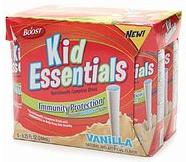Ads
Nestlé will drop claims of health benefit in drink
 According to a recent Nestlé ad campaign aimed at parents, a drink called Boost Kid Essentials was so good for children that it could keep them from getting colds and missing school.
According to a recent Nestlé ad campaign aimed at parents, a drink called Boost Kid Essentials was so good for children that it could keep them from getting colds and missing school.
But on Wednesday, the Federal Trade Commission said the ads were deceptive and announced that Nestlé had agreed to stop making the claims.
The move was the second in two months aimed at deceptive advertising by a major food manufacturer for products meant for children. A commission official said that the agency was taking a close look at the proliferating number of health claims made for all types of products on supermarket shelves.
"Food companies are marketing more of what they call functional foods," said Karen Mandel, a staff lawyer for the trade commission. The term refers to foods with added nutrients that companies claim can bring health benefits to people who eat or drink them.
"If the claims are not substantiated, that's what we're looking for, to make sure the claims are truthful," Ms. Mandel said.
The action Wednesday involved Boost Kid Essentials, a nutrient-laden beverage made by Nestlé HealthCare Nutrition that comes with a straw containing probiotic bacteria, which is similar to the live cultures in yogurt. Many people say they believe that probiotic bacteria aid digestion and provide other benefits.
According to the commission, the television and magazine ads and the Web site and packaging for Boost Kid Essentials made a series of claims that the probiotics in the straw could strengthen children’s immune systems, protecting them from colds and diarrhea and keeping them from missing school.
But the commission said there was not enough scientific evidence to back up the claims.
Nestlé said in a statement that the settlement "provides clarity regarding new advertising standards applicable to health benefit claims for Boost Kid Essentials and similar products."
Ms. Mandel said the action was based on existing regulations and did not represent a new enforcement standard.
Nestlé did not admit wrongdoing as part of the settlement and the company was not fined.
The trade commission's action came about six weeks after it announced that Kellogg had agreed to stop making a claim that nutrients added to its Rice Krispies cereal helped bolster children's immunity to illnesses.
That agreement expanded on a 2009 settlement with the company over exaggerated health claims for another cereal, Frosted Mini-Wheats, which the company had advertised as "clinically shown to improve kids’ attentiveness by nearly 20 percent."
Marion Nestle, a nutrition professor at New York University who is not related to the Nestlé company, said that with the recent actions, the F.T.C. had begun to take an unusually active role in policing health claims on foods. "I would consider this groundbreaking," she said.
(Published by The New York Times – July 14, 2010)